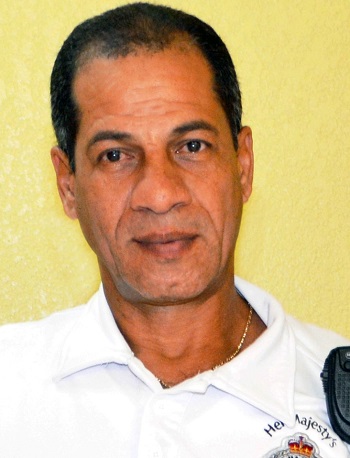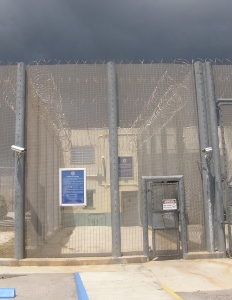Archive for October, 2014
Child killed, woman arrested
(CNS): Police arrested a 37-year-old woman in connection with the killing of a six year old girl, just hours after the child’s body was discovered early this morning in a car parked on the Queen’s Highway, Chief Superintendent Kurt Walton confirmed Monday. Walton said police had opened a murder investigaiton but would not say whether or not the woman in police custody was the little girl’s mother and whether she had attempted to take her own life before her arrest. The child’s body was discovered at around 4:30am by officers on patrol in East End, further along the Queens Highway. During a press briefing at police HQ, Walton said police activity at a home in the Savannah Newlands area this morning was connected to the murder investigation but would not confirm if the house was where the woman or the child lived.
Offering his condolences to the family for the tragic death of the girl, he said police were unable to say very much at such an early stage in the investigation. He stated that police had not yet established the cause of death and refused to state the nationality of the victim or the woman who was arrested. The senior cop also refused to comment on whether or not the arrested woman's husband was a police officer.
The as yet unnamed little girl is the third murder victim of 2014 and the first young child killed in Cayman in more than four years. Four-year-old Jeremiah Barnes was shot and killed at a gas station in West Bay in February 2010, when a masked gunman opened fire on the family car that he was travelling in with his parents and brother.
Police are urging anyone who has information in relation to this latest murder to please call 949 7777 or Crimestoppers 800 TIPS.

Frontline public servants get deputy governor’s gongs
 (CNS): Senior Social Work Assistant Donette Morris-Seymour was the first government worker to receive the Deputy Governor’s top civil service award for this financial year when she was named employee of the month for July. Morris-Seymour was described as giving much of her own time to ensure her clients' needs are met, coming in early, staying late and working weekends. Meanwhile, in August Marlon Hodgson the manager at the Immigration Detention Centre (IDC), which saw an escalating number of escapes earlier this year was named employee of the month for his work handing the centre over to the prison service.
(CNS): Senior Social Work Assistant Donette Morris-Seymour was the first government worker to receive the Deputy Governor’s top civil service award for this financial year when she was named employee of the month for July. Morris-Seymour was described as giving much of her own time to ensure her clients' needs are met, coming in early, staying late and working weekends. Meanwhile, in August Marlon Hodgson the manager at the Immigration Detention Centre (IDC), which saw an escalating number of escapes earlier this year was named employee of the month for his work handing the centre over to the prison service.
Morris Seymour was said to not only be very helpful to her clients having earned the title of "most helpful" she also holds her clients accountable and tries to empower them to improve their lives.
The deputy governor, Franz Manderson, who created the awards to help boost morale during uncertain times for the civil service and to award those government workers who stand out praised Morris-Seymour for her sensitivity and for putting in extra hours to complete urgent assignments and projects.
 Although the Immigration Detention Centre had been at the centre of some controversy recently after numerous escapes and a near riot at the Fairbanks location when numbers of Cuban migrants detained there increased significantly as a result of repatriation problems, the manager Marlon Hodgson was said to have ensured the refugees receives decent, fair and humane treatment.
Although the Immigration Detention Centre had been at the centre of some controversy recently after numerous escapes and a near riot at the Fairbanks location when numbers of Cuban migrants detained there increased significantly as a result of repatriation problems, the manager Marlon Hodgson was said to have ensured the refugees receives decent, fair and humane treatment.
“Hodgson singlehandedly managed IDC’s recent handover from Immigration to the Prison Service, overseeing all aspects of the transition, including: finance, operations, support services and staffing. He has risen to the challenge of managing and providing a first class service to residents,” a government official said.
Hodgson was also credited with improving physical conditions at the IDC, raising the standard of services for detainees, enhancing staff response to changing client needs and better information sharing about the IDC between the Governor’s Office, the Home Affairs Ministry, Immigration and the Prison Service.
Knowing the importance of communications to maintaining good relations, Hodgson has also been learning Spanish to better communicate with the detainees.
Happy Hour on the rocks after stormy night
(CNS): The stormy night caused something of a hangover for a local pleasure cruiser after the vessel broke from its moorings Friday. The ‘Happy Hour’ was washed up on the rocks in downtown George Town during Friday night's localised storm. Although other vessels were also believed to have had a bad time, according to Hazard Management, there were no other reports of any significant damage to property during the nighttime drenching. According to the latest forecast, Cayman can expect more turbulent weather over the next few days as a stationary front to the east spreads in and out of our area during the next 24 hours.
Meanwhile, the remnants of TD9 has turned into Tropical Storm Hannah off the coast of Nicaragua, though it is not expected to pose any threat to the Cayman Islands.

Cops open child death enquiry
(CNS): Police have just revealed that a child has died in the eastern districts under suspicious circumstances. An RCIPS spokesperson has offered no further information other than the death was reported at 5:43am on Monday 27 October off the Queen's Highway and an enquiry has begun. No other sources have reported anymore details. In the meantime, until police release further information officers are asking anyone who has information in relation to this death to please call 949 7777 or 800 TIPS.

Full jail terms to be served
 (CNS): There will be no more unsupervised early release for anyone sentenced to jail with the introduction of a new law that changes the regime surrounding the treatment of offenders and their release. With no more 'get out of jail free' passes, all inmates will be required to undergo training and rehabilitation before they walk out of HMP Northward, and prisoners who satisfy the new release board will still serve the remainder of their sentence under strict supervision. No prisoner will be released before serving 60% of his jail term behind bars, and if deemed ready to return to the community, he will be properly supervised throughout the remaining 40% and any infractions will see offenders back in their cells.
(CNS): There will be no more unsupervised early release for anyone sentenced to jail with the introduction of a new law that changes the regime surrounding the treatment of offenders and their release. With no more 'get out of jail free' passes, all inmates will be required to undergo training and rehabilitation before they walk out of HMP Northward, and prisoners who satisfy the new release board will still serve the remainder of their sentence under strict supervision. No prisoner will be released before serving 60% of his jail term behind bars, and if deemed ready to return to the community, he will be properly supervised throughout the remaining 40% and any infractions will see offenders back in their cells.
The conditional release bill, which passed through its second reading on Friday evening in the Legislative Assembly, creates a new regime regarding how much time prisoners serve and how that times is managed. Replacing the parole provisions in the prison law, the premier, who introduced the bill, said it would result in a lower risk of re-offending.
Explaining the major changes in the bill, Alden McLaughlin, who is also the home affairs minister and responsible for the prison, said the law focused on rehabilitation and was aimed at reducing the country’s very high rate of recidivism. Cayman has a 73% re-offending rate, which is the highest in the Caribbean, and experts say it is because prisoners are released early without having undergone proper rehabilitation or training. They are released without any monitoring back into the exact environments they left before landing in jail.
“We are told by the police all the time that when certain people are released crime spikes and when they round up the set of people and they are back in jail there is fall-off,” McLaughlin said. He added that the current spike in crime was likely down to the release of certain prisoners and once the police have the evidence to arrest and charge them, the crime level will fall.
McLaughlin explained to his colleagues that the current early release system is not conditional on prisoners reforming and when released from Northward offenders are not monitored or supervised.
“Under this law no prisoner will be released without supervision,” he told the LA. “Ten years will mean ten years,” he added, explaining that at least 60% must be served inside jail. Then the prisoners will be entitled to appear before the conditional release board and if the offender has successfully completed rehabilitation and training, he will be released to serve his remaining 40% under a supervision order with the Department of Community Rehabilitation until the full sentence is spent.
McLaughlin said although people expected wrongdoers to be punished, government had to address offending behaviour and make a concerted effort to reform people before they are released because, despite a long history of attempts at reform, none had worked.
At present, most prisoners are released after serving two-thirds of their sentence, regardless of their state of rehabilitation and are not subject to any supervision. The premier said that in some cases prisoners can be released even earlier because they can appear before the parole board, where release can be granted after just one third of a prisoner's time being served, depending on the offence. If they are released 'on license', this is enforced until what would have been the early release date of two-thirds of their sentence.
Under the new system there will be no consideration of release until inmates have served 60% of their sentence. McLaughlin said that in order to be released to serve the remaining 40% in the community under supervision, prisoners must be considered at a low risk of re-offending.
He said existing prisoners will not be adversely affected or spend longer in jail because of the new law if their early release date comes sooner than the new 60% term.
The premier said that government had to address the poor recidivism rate to address the crime problem. He said that the police were criticised heavily for not doing enough to fight crime but while they might not be perfect, by the time the police are involved “a lot of other things have gone wrong”.
He said he wasn’t going to "beat up" on the police or the civil service to satisfy populist sentiments and added that government had a duty to act constructively and address the issues, not pay lip service or sound off.
“Government is trying to do something to address recidivism and find a means for those who offend over and over again to get off that wheel,” he said.
McLaughlin said it was by no means the end of the story and it will not solve the crime problem but he described it as a major step and offenders will know that they will not get out of jail early unless that have taken part in a rehabilitation programme.
He admitted that the new regime would put pressure on the Department of Community Rehabilitation and he was very conscious of the agency’s ability to cope with the increased workload but he said that was not a reason to not do anything.
“I am painfully conscious of these issues but does that mean we sit on hands and not make an effort to change a system that not working?” he asked.
Raising his concerns about the civil service being the target of considerable criticism, he said that, like it or not, government would need to recruit the necessary staff in the prison, police, courts as well as the social service departments.
“We need these things,” he said, as he pointed out the pressing need to address crime and the social issues at heart of the criminality and the need to find the resources for the agencies dealing with the criminal justice system and social depravation.

Police investigate three car pile up
(CNS): Drivers were being asked to avoid Crewe Road, George Town, around lunchtime on Sunday, following a three car pile up near Ryan's Retreat . Although five people, including three children ages 13, 10, and 7 years, and two adults, were taken to hospital no one was seriously hurt and received what appeared to be minor injuries. Police said they received the report of the smash at12:49 pm but have not yet said what they believed had caused the collission as the investigation gets underway.

West Bay cops move to school for station clean-up
 (CNS): The West Bay police station will close on Monday for three days when exterminators arrive to de-bug the location. An RCIPS spokesperson said that the police and staff will move to Sir John A. Cumber Primary School until Thursday when they are expected to move back to a fumigated cop shop. Members of the public wishing to make a report via phone should call 345-516- 6135 and anyone wishing to make a report in person should attend School Room 4B. Signs will be erected to direct people to the temporary site.
(CNS): The West Bay police station will close on Monday for three days when exterminators arrive to de-bug the location. An RCIPS spokesperson said that the police and staff will move to Sir John A. Cumber Primary School until Thursday when they are expected to move back to a fumigated cop shop. Members of the public wishing to make a report via phone should call 345-516- 6135 and anyone wishing to make a report in person should attend School Room 4B. Signs will be erected to direct people to the temporary site.

Lifers to get 30 year tariffs
 (CNS): The government has finally addressed the problem of mandatory life sentences without the possibility of parole for murder, which contravenes the Bill of Rights, and set a starting point tariff of 30 years for those given a life sentence. Judges will now have the discretion to impose a higher tariff for aggravating factors or lower in certain circumstances but all lifers will be given a set period of time to be served before they can be considered for release under supervision. The Conditional Release Law, which also deals with a new more controlled release regime under supervision for all her offenders, was passed in the Legislative Assembly on Friday evening with mixed support.
(CNS): The government has finally addressed the problem of mandatory life sentences without the possibility of parole for murder, which contravenes the Bill of Rights, and set a starting point tariff of 30 years for those given a life sentence. Judges will now have the discretion to impose a higher tariff for aggravating factors or lower in certain circumstances but all lifers will be given a set period of time to be served before they can be considered for release under supervision. The Conditional Release Law, which also deals with a new more controlled release regime under supervision for all her offenders, was passed in the Legislative Assembly on Friday evening with mixed support.
Not all MLAs support the tariff but accepted that, given pressure from the UK and the Bill of Rights, the Cayman government had to act and address the issue. The debate about introducing a tariff system has been a long one, and despite opposition from at least one of its own backbenchers as well as some from the opposition benches, the government has finally addressed the problem that was about to see the government challenged in the courts.
Speaking about the law, which will completely change how all prisoners serve their sentences and how they are treated when released, the premier confirmed that over the next two years all of the people currently serving life sentences will have their cases reviewed by the Grand Court and all of the lifers in HMP Northward will be given tariffs, which will be revealed in open court.
See the new bill below and check back to CNS later for more from the debate in the LA.

Would-be robbers hit on Brac
 (CNS): A woman on Cayman Brac received minor injuries on Wednesday when she was slammed against her car and pushed to the ground by two masked men, police revealed Friday. What appears to be an attempted robbery took place outside the victim’s home in West End, Cayman Brac, but nothing was stolen as the would-be robbers were scared off when a neighbour intervened. The incident happened as the woman was getting out hercar outside her residence at about 9:15 in the evening when she was forcibly shoved against her vehicle before the men ran off towards Market Place on foot.
(CNS): A woman on Cayman Brac received minor injuries on Wednesday when she was slammed against her car and pushed to the ground by two masked men, police revealed Friday. What appears to be an attempted robbery took place outside the victim’s home in West End, Cayman Brac, but nothing was stolen as the would-be robbers were scared off when a neighbour intervened. The incident happened as the woman was getting out hercar outside her residence at about 9:15 in the evening when she was forcibly shoved against her vehicle before the men ran off towards Market Place on foot.
Although street robberies are increasingly common on Grand Cayman, they are still rare on the Brac. This incident is bound to raise public concern that the rising crime on the most populated island is spilling over into the Brac.
Police confirmed that the men were not believed to be armed with any weapons and were described as medium build and average height. Neither of the masked men spoke during the foiled robbery attempt.
An RCIPS spokesperson said the matter is now under investigation by officers from the Cayman Brac Police Station and anyone with information is asked to call CBPS at 948 0331, RCIPS tip-line 949-7777 or Crime Stoppers on 800 8477(TIPS).

JP regulations not in force
 (CNS): Although government committed to regularizing and training justices of the peace as well as implementing a code of conduct to prevent police using JPs with no legal knowledge to sign questionable warrants, the new regime has not been implemented. A local attorney who is trying to complain about yet another failure of procedure regarding a warrant has been told that his complaint cannot be addressed because, despite public announcements about their implementation, the regulations are not in force. The need to address the JP system was also one of a list of conditions from the FCO in 2009 tied to its approval of the UDP government’s borrowing in the 2010 budget.
(CNS): Although government committed to regularizing and training justices of the peace as well as implementing a code of conduct to prevent police using JPs with no legal knowledge to sign questionable warrants, the new regime has not been implemented. A local attorney who is trying to complain about yet another failure of procedure regarding a warrant has been told that his complaint cannot be addressed because, despite public announcements about their implementation, the regulations are not in force. The need to address the JP system was also one of a list of conditions from the FCO in 2009 tied to its approval of the UDP government’s borrowing in the 2010 budget.
Five years later, despite announcements regarding a new regime and training for all JPs, the creation of a code of conduct, as well as a commitment from the police to only use judges, magistrates or JPs with legal qualifications for warrants, it appears that JPs who have no understanding of law continue to sign off on warrants with no questions asked.
Criminal defence attorney, Peter Polack, said it took three months for Legal Services and Judicial Administration to advise him that the JP regulations are not in force. With a criminal complaint pending over a warrant signed by a JP incorrectly and not in line with procedure, leading to an illegal search, Polack has reported his concerns the complaints commissioner and now the deputy governor.
The case, which deals with a client of Polack’s facing charges relating to drug offences, is now expected to be delayed as a result of the failure of anyone to address his complaint because of the claims that there are still no rules relating to JPs. Polack is now planning to summon the deputy governor in his client’s case in Summary Court next month.
The latest failing in government’s management systems comes after a long questionable history about the misuse of JPs by the police in various circumstances. This first came to the public’s attention in a significant way following the arrest of a high court judge, some six years ago, during the now infamous Operation Tempura internal police probe.
Grand Court Judge Alexander Henderson was arrested on24 September 2008 on suspicion of misconduct in public office based on a warrant signed by Carson Ebanks, a JP who had no legal qualifications and did not understand the law. A court later found that the judge was arrested unlawfully and was awarded damages from the public purse in excess of $1.2 million.
Along with a number of other infringements over the years, further problems were exposed in a more recent case. Local activist Sandra Catron, while defending herself in a judicial review after she was arrested for crimes relating to the misuse of an ICT network, also demonstrated that police were using JPs with absolutely no comprehension of the laws relating to the warrants they were signing.
In her case, the court heard that the JP had never once refused to sign a warrant or question anything to do with them over the course of two decades. He also admitted knowing nothing about the law, the evidence or anything else relating to the warrant he had signed. As a result the warrant was thrown out.
Despite assurances from the RCIPS and the deputy governor’s office that things would change, Polack’s client was arrested and his home searched under what turned out to be yet another illegal warrant.
The failure to implement the regulations leaves the public without any course of redress when the police continue to execute illegal warrants, misuse of power by the police and ultimately possible miscarriages of justice. With the implementation of the Bill of Rights in the Cayman constitution, it also exposes government and the public purse to potentially very costly human rights challenges.
The new JP regime was also noted in a letter from Chris Bryant, the then overseas territories minister, in 2009 approving the 2010 budget on the basis of a number of conditions.
The new regulations establish a Code of Conduct for Justices of the Peace and a procedure for making a complaint about their conduct. Five years later there is still no such regulations in place and nothing to prevent abuse.